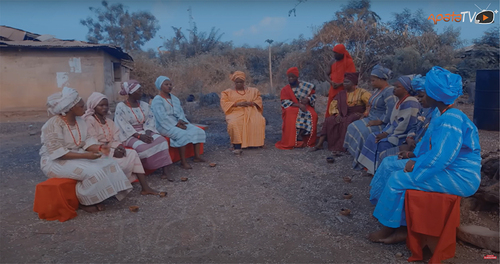Citation:
Jemiluyi, Omotayo. 2025. “Àjẹ́kùnrin: Witchcraft, Gender Politics, and Gender Nonconformity in Yoruba Spirituality.” Journal for Cultural Research, 1–16. https://doi.org/10.1080/14797585.2025.2471789.
Summary:
This article examines Àjẹ́kùnrin, a Yoruba Nollywood film directed by Sharafadeen Olabode, as a site of gender exploration through the lens of African spirituality and indigenous epistemologies. By centering the concept of àjẹ́ (Yoruba witchcraft), the study investigates how gender is portrayed not as a fixed binary, but as one that’s shaped and negotiated through spiritual forces. The film disrupts Western frameworks of gender identity and instead portrays witchcraft as a contested space of power, agency, and gender nonconformity. Drawing on Yoruba cosmology and indigenous thought, the article positions Àjẹ́kùnrin as a valuable contribution to the decolonization of global gender discourse.
Behind the Work:
This article was born of serendipity. I was casually watching Yoruba Nollywood films as I often do while working, sometimes for background noise, sometimes to find comfort in a cultural rhythm that makes “home” feel close, even when abroad. That’s exactly how I stumbled upon Àjẹ́kùnrin. I had seen its advert in a few Yoruba films and finally noticed it was available at a particular time I was scrolling on YouTube. Of course, I clicked play and upon watching, I was really fascinated by the storyline which meshed gender, witchcraft, and by extension, Yoruba spirituality into a very intriguing plot.
The film’s portrayal of what one may call spiritual transgenderism, which I look forward to fully exploring in one of my later works, and refers to gender transformation through metaphysical means, was one that I found very innovative and have not, in fact, come across through my years of watching Nollywood films. More interestingly, at the time that I had come across the film, I was enrolled in a course on gender identity, disability, and sexuality, albeit in the context of French medieval texts, and my term paper due date was fast approaching. I floated the idea of writing on Àjẹ́kùnrin to my professor, who also happened to be the department chair, and she welcomed it, and I was excited.
This article is very meaningful to me. Why? It was my first film study, born from a spontaneous encounter and culminating in publication in a Q1 journal! As the Yorùbás would say, ó là mì lá gàn, it “unlocked” my fertility, or in this case, awakened my scholarly fecundity. It gave me the confidence to keep exploring Nollywood critically and to commit to theorizing African ways of knowing through African artistic expressions.
Key Ideas:
- Àjẹ́ (witchcraft) functions as a spiritual site where gender can be renegotiated beyond biological or social roles.
- The film challenges the dominance of Western gender frameworks by proposing a metaphysical understanding of identity.
- Yoruba spirituality becomes a mode of gender subversion, not only empowering but also complicating the notion of female and male agency.
- The study contributes to the decolonization of gender studies, advocating for Indigenous African perspectives in global academic discourse.
Relevance:
This work contributes to African studies, gender nonconformity in African spiritual contexts, film studies, and indigenous epistemologies. It will be of interest to scholars in decolonial theory, cultural studies, and anyone curious about how Nollywood disrupts normative gender ideologies through spiritual aesthetics.
Read the Full Article:


